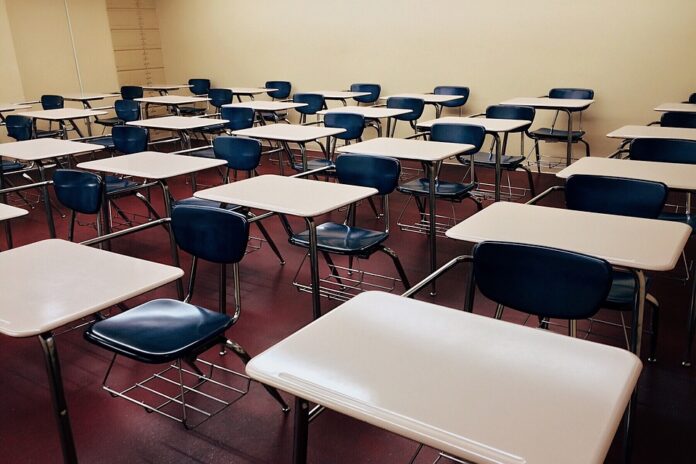
TOMS RIVER – Officials said taxpayers in Toms River, Pine Beach, Beachwood, South Toms River and even Seaside Heights would see reduced taxes if the Toms River Regional School District takes in all Seaside Heights students. This was shared by Superintendent Michael Citta during information sessions before the April 16 referendum.
A referendum is a special election. Residents in all of the above towns will be voting. If the “yes” votes win, the changes will come about in September with the 2024-2025 school year. However, if Seaside Heights votes “no” to regionalization, it doesn’t matter if Toms River votes “yes.”
Speaking to residents and staff at Intermediate South’s cafetorium during one of three information sessions, Citta outlined the financial position that caused this to happen. Before S-2 and before current financial shortfalls, there was Superstorm Sandy.
Sandy and the boardwalk fire gave a 1-2 punch in 2012 and 2013. The state provided special aid to the Seaside Heights school district. As a condition of this aid, Seaside had to do studies to see if they could save money by joining another district. This situation flowed out of that study.
Where Will Seaside Kids Go?
There has been a lot of disinformation online about this very important topic. Part of this is because there are people intentionally misleading voters. Part of this is because the plan for Seaside kids changed a month ago.
The Seaside kids currently go to the Hugh J. Boyd Jr. School for kindergarten through 6th, and then go to Central Regional for middle and high school.
A February 27 letter from Toms River Schools’ attorney to the State Department of Education said that Boyd could stay open for the 2024-2025 school year and four years after. Staff and students would remain unchanged.
Originally, Seaside Heights officials were going to close down the Boyd school. The plan approved by Acting Commissioner of Education Kevin Dehmer in March would keep Boyd open. The school would be run by a local principal but under the umbrella of Toms River Regional administration. This is the same situation as Beachwood, Pine Beach, and South Toms River elementaries.
“Their staff would become part of our family,” Citta said.
The kids might eventually go to East Dover Elementary, which Citta picked because it’s the closest school to Seaside and because there’s room for them. However, with the school staying open for at least a few years, the immediate placement would be, based on current grade:
- Kindergarten through 5th: stay at Boyd in September
- If you’re in 6th now, you’d go to Intermediate East in September
- If you’re in 7th now, you’d have the option to go to Intermediate East or Central Middle in September
- If you’re in 8th now, you’d go to High School East in September
- 9th-11th: option to go to High School East or Central High in September
“Once you’re ready to transition buildings…you transition districts,” Citta said.
There was a public outcry about closing the school in the beginning of this process.
“We’re going to keep the school open, if it’s passed, up until five years – minimum two – or at least until enrollment drops below 125,” Citta said. He noted there are a large number of homes being built in Seaside right now.
He said there are about 175 students currently in Boyd, and less than 300 if you add middle and high school students. There would be a continuity of curriculum if all of them were in the same district.
Finances
The taxes coming from Seaside would be an annual revenue. According to district officials, over the course of 10 years, the estimated tax savings to regionalization is:
- Seaside Heights: $9M
- Toms River: $35M
- Beachwood: $2M
- Pine Beach: $680,000
- South Toms River: $480,000
Additionally, Toms River Regional would qualify for funding that currently only one other school does. The only box they currently can’t check off is that they don’t have five towns. If they absorb Seaside Heights, their state aid reverts back to what it was two years ago.
Citta said that due to the S-2 funding formula that state lawmakers passed several years ago, the state aid was cut every year – and every year saw a deeper cut than the last. The district is looking at a $26.5 million deficit for the 2024-25 school year. Over the length of S-2, the district has lost cumulatively $137 million.
As a result, the district has “cut hundreds of positions,” he said. “We’ve reached the point where we can’t cut anything else.”
Another state law limits taxes from being raised more than 2 percent, so the money has to come from somewhere else.
In past years, there have been one-time fixes, such as selling land to the town for open space. The state has also made stabilization aid available to towns that have been cut severely.
During a recent Board of Education meeting, Citta spoke to the board and public about addressing the State Senate and Assembly. He said some of the decision makers in Trenton don’t realize that stabilization aid isn’t permanent. The fact that stabilization aid exists shows that the S-2 funding formula doesn’t work and the state knows it.
Another way to get aid would be to take a loan from the state. However, that incurs a future cost in paying it back. Additionally, the state will require an overseer stationed to the district that the district will have to pay for.
The poverty level of the residents has increased from about 21 percent to about 41 percent over the course of S-2, and yet funding continues to be cut, he said. The number of English Language Learners has grown by 600% in the last two years. The costs for special education has increased by $17.6 million. While there used to be 17,000 students, they are now in the neighborhood of 14,400.
The demographics of Seaside Heights kids are very similar to Toms River’s, he said.
Citta also took the time to correct a misrepresentation of what Gov. Phil Murphy said about closing schools. The governor said that districts in similar positions should look to close schools. Many people have took this comment to mean that Murphy said Toms River should close a school but he was not speaking about Toms River specifically. He was talking about school districts in general.
Impact On Central
Central Regional officials have been challenging the idea of Seaside leaving. They said that they can provide better instruction than Toms River, listing factors such as Toms River not providing afterschool busing. They were also worried about the financial impact of an entire town’s worth of tax revenue leaving.
Business Administrator William Doering said that the $3 million in taxes coming from Seaside Heights would leave Central and then come to Toms River. However, Central would be made whole in the immediate term, then there would be a five-year phase out of taxes. “It’s not like if this passes, that $3 million gets ripped out away from Central Regional. It remains and then there’s a phase-out.”
Pre-K
Seaside Heights has pre-kindergarten for all students. That will continue, Citta said.
Toms River hasn’t been able to make universal pre-k happen because it is a larger and more expensive undertaking. However, regionalization would make it a reality.
“A yes vote on April 16 makes that application go in,” he said.
It would be incremental. It would start with a lottery to go in, using local providers, he said. It would take several years to make it available for all kids.
Buses
Parents expressed concerns about busing for students for extracurricular students. They said that Central provides busing for kids when Toms River parents have to do the driving.
“We’re hoping to reinstate late buses,” Citta said. There was funding set aside for it but the district didn’t get any bids back for that service.






